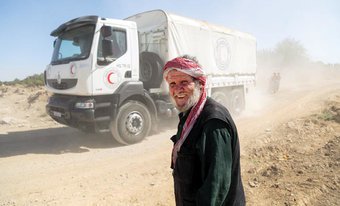Beirut, Aug 1: Food access in Syria’s battle-torn Raqqa is now at “a critical turning point,” aid organizations said Monday, with markets shuttered and residents depending fully on their dwindling stockpiles.

Raqqa has been gripped by fierce fighting for nearly two months and the US-backed Syrian Democratic Forces have ousted Daesh from half of the northern city.
An assessment released Monday by REACH, a network of humanitarian organizations operating around Raqqa, painted an increasingly dire picture.
“While in previous weeks residents were able to purchase some food at markets, the majority of key informants reported that residents are now relying entirely on food stored from previous weeks,” it said.
“Food markets, which were functioning sporadically three weeks ago, are generally no longer in operation.”
Bread was consistently found in 15 of Raqqa’s 24 neighborhoods several weeks ago. Now it is no longer regularly available anywhere in the city.
Food prices have also skyrocketed, forcing residents to eat smaller meals or skip them entirely, the report said.
Raqqa is Being Slaughtered Silently (RBSS), an activist collective publishing news from inside the city, has also warned of food problems.
“The bakeries are closed because there’s no fuel or flour, and the shopowners have fled. Whatever flour is here is spoiled and full of worms,” RBSS activist Husaam Eesa said earlier this month.
“People can’t store things in the refrigerators because there’s no electricity. They can’t cook because there’s no water.”
The UN estimates that between 20,000 and 50,000 people are still in Raqqa, but REACH said the number could be as low as 10,000.
It estimated that the most densely populated district was Al-Hurriya in the north, with at most 5,000 residents, and that 14 out of the 24 neighborhoods were abandoned or almost abandoned.
According to REACH, only one wing of Raqqa’s state hospital is still functioning but offers just basic first aid.
Medical charity Doctors Without Borders (MSF) echoed those concerns on Monday, saying wounded civilians were often trapped in the city for days or weeks without medical care.
“In Raqqa city, if you don’t die from airstrikes, you die by mortar fire; if not by mortars then by sniper shots; if not by snipers, then by an explosive device,” a 41-year-old with shrapnel wounds to his chest told MSF after he fled Raqqa.
“And if you get to live, you are besieged by hunger and thirst, as there is no food, no water, no electricity.”
AddThis Sharing Buttons
Share to FacebookShare to TwitterShare to Google+Share to WhatsApp






Comments
Add new comment